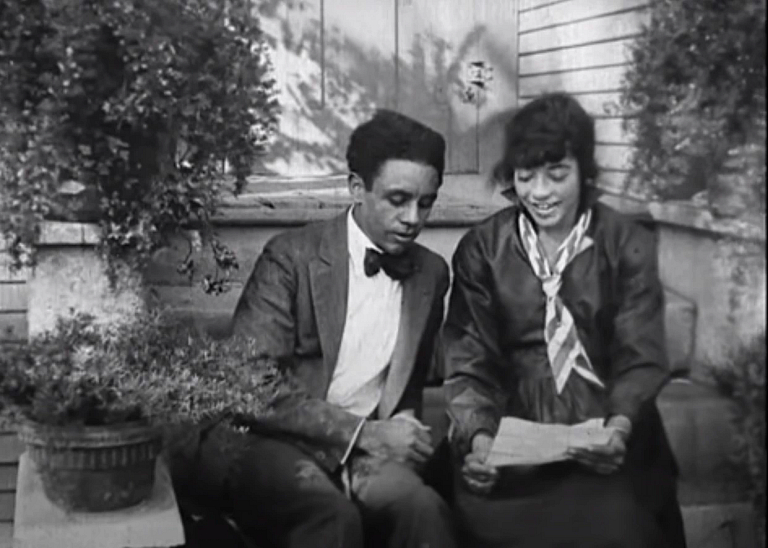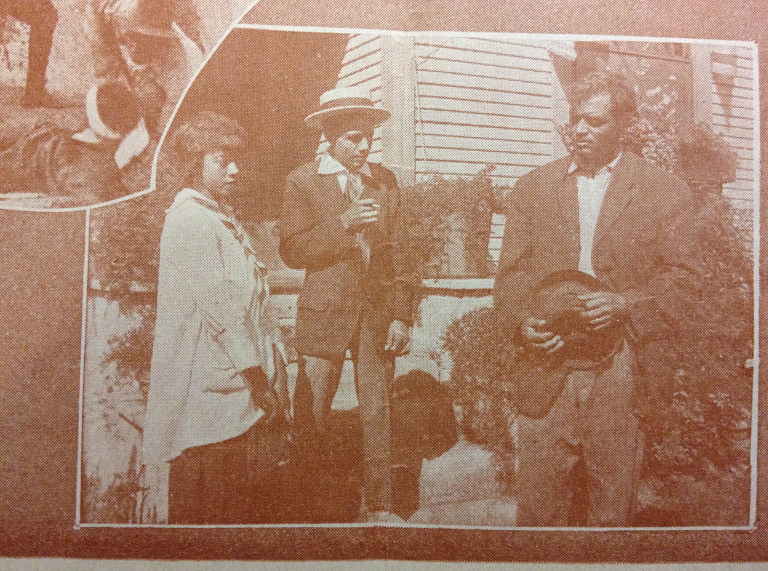BLOOMINGTON, Ind. – A casual viewing of a Black film production from 1921 and a keen eye for detail led an Indiana University Bloomington film expert to discover “lost” footage from 1916 – the earliest surviving footage from a Black film company. The footage has been reviewed and verified by the Library of Congress after it was discovered by Cara Caddoo, associate professor in The Media School and the College of Arts and Sciences’ Department of History at Indiana University Bloomington.
The footage from the silent film “The Trooper of Troop K” dates to 1916, not long after the first Hollywood-produced feature film was released. The discovery, made by Caddoo as she watched another “race film” from 1921, is an important one for film historians.

“Race films” were created by and for Black and mixed-race audiences. While the films were popular among African American theater-goers during the first half of the 20th century, critics and film historians often overlooked their impact. “The Trooper of Troop K” was produced by the Lincoln Motion Picture Company, one of the first race film companies in the United States.
“The footage has been hidden in plain sight for years – somehow cut into another Lincoln film from 1921,” said Caddoo, a historian of film, mass media, race and African American history who works with the Black Film Center and Archive at IU Bloomington. “It has been misidentified by scores of scholars.”
The Library of Congress recently published a blog regarding the discovery, co-written by Caddoo and her colleague Allyson Nadia Field, a professor at the University of Chicago. The footage is now available in the Library of Congress’ National Screening Room collection.
According to a 2013 study commissioned by the Library of Congress’ National Film Preservation Board, about 75% of American silent features are lost, mostly due to deterioration and decomposition. An even smaller number of race films have survived.
Caddoo discovered the lost footage during the pandemic while viewing “By Right of Birth,” a Black film production from 1921 with only four minutes of surviving footage. A portion of the film caught her eye.

“I realized a short section of the widely distributed copy of ‘By Right of Birth – on Kino Lorber’s DVD set ’Pioneers of African-American Cinema‘ – appeared incongruous with the rest of the film,” Caddoo said. “I had never noticed that one of the title cards, decorated with images of a cacti-studded desert, was different from the rest. I then noticed the two actors in the scene were the actors from ‘Trooper of Troop K,’ and their title card, ’Don’t believe that stuff that Joe writes I know those soldiers …’ seemed to reference the character from ’The Trooper of Troop K.’”
She said she was certain she had seen a similar image of the characters in the George P. Johnson Negro Film Collection at UCLA, but she ran into dead ends when she contacted the archive about the provenance of the film at the height of the pandemic.
“It was only when I spoke with my friend and colleague Allyson Nadia Field, a professor at the University of Chicago who’s written extensively about the Lincoln, that my questions began to get some traction,” Caddoo said. “When Ally and I spoke, we wondered, ‘If the footage really is from ‘Trooper,’ did the Lincoln intentionally include it in ‘By Right of Birth’? Or did someone else – accidently or intentionally – add it in later?”
While searching through her records from the George P. Johnson Collection, Caddoo found a copy of a flier for “The Trooper of Troop K” that shows the characters standing in front of the same house. The costumes matched as well.

“I dug through my records and found an image from an advertisement that matches the scene,” she said. ”An iris image in the corner also shows Lincoln co-founder Noble Johnson, who had quit the Lincoln company in 1918.”
Noble Johnson, the first Black member of the Screen Actors Guild and the subject of a book Caddoo is currently writing, co-founded the Lincoln Motion Picture Company in 1916. The company was assisted by Willis O. Tyler, one of the most prominent black attorneys and a civil rights advocate in Los Angeles. Tyler, a Bloomington native and a 1902 graduate of Indiana University, helped the company incorporate and offered legal support.
“‘The Trooper of Troop K’ is a testament to the creativity, resourcefulness and innovation of early Black film,” Caddoo said. “We still have many questions to answer about the film, some of which we may be able to eventually answer, and some which may never be answered.”

